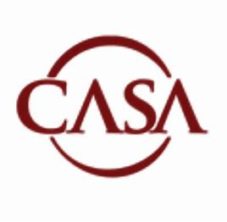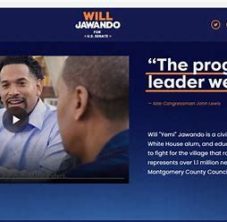Montgomery County Council Member Will Jawando had a busy 2022. There was an election for another term on the County Council (“At-Large”, of course) and a book tour to complete. It appears the Jawando family moved into a massive new home in Sandy Spring, MD as well.
While promoting his book last February at Catholic University, Mr. Jawando dropped this nugget (which is evidenced by his votes / support for every paternalistic resolution the MoCo Council issues):
As Jawando spoke, he noted, “All of these relationships were very different, and I needed every one of them—and I still need them. I’m still being mentored, I’m still being fathered, and I seek to do that for others as well.”
In the second half of the program, Jawando answered questions posed by Professor Veryl Miles as well as several questions from those in attendance.
It is telling that Jawando “seeks to do that [fathering] for others as well.” His paternalism is on constant display in public policy, such as back in December, 2021 when he supported a dubious “vaccine passport” for Montgomery County residents attempting to simply dine indoors or attend a concert.
“Jawando said despite the county’s high vaccination rate, more can be done to protect people. Requiring proof of vaccination is also in line with D.C., which has a similar mandate. I think this is the responsible thing to do. If you want to go out in a congregate setting, these are the rules we have to deal with right now, considering where we are with hospital capacity and how omicron is spreading.”
But curiously, this paternalism ends when it comes to liquor, lottery and other county / state of Maryland money-making vice enterprises that, indeed, lead to inequality and poor health outcomes. The Maryland Lottery, in particular, would seem to be an easy target for Mr. Jawando’s ire and public-policy chops. Why is the state of Maryland promoting such a destructive habit among its residents?
The excellent organization “Stop Predatory Gambling” states, correctly:
Creating wealth by the accumulation of assets and the investment of savings is the direct opposite of what state lotteries represent and encourage. “The Fastest Way to a Million Dollars,” “Road to Riches,” “$200,000 a Year for Life,” “$10,000,000 Bankroll,” and “$7,000,000 Supercash” are just a sampling of the hundreds of different lottery scratch tickets that state governments across the United States are marketing at this very moment during a time when more than 20 million citizens are unemployed, of which a disproportionate amount are African-American.
Mr. Jawando did oppose a lottery, once (in 2016). But it wasn’t the destructive Maryland Lotto. It was the MoCo Public School’s “Language Immersion Program” and Mr. Jawando was upset his children didn’t get a slot.
Language-immersion slots in Montgomery are awarded by lottery, but siblings of elementary students already enrolled get automatic admission — a practice the district’s report said leaves fewer seats for others and “hindered equity of access.”
Jawando said in an interview that he and his wife only heard about the district’s language-immersion programs through a chance conversation at their daughter’s soccer game a few days before the application deadline in April.
What about the actual Maryland Lottery, Mr. Jawando? Any deep thoughts on it? Should it continue, in present form, even with all the data you can no doubt access showing how it disproportionately harms lower-income people?
And most glaringly, Mr. Jawando is very outspoken about racism and in 2020, he sponsored a County Council “resolution” declaring it a ‘public health crisis’. But here, too, he says absolutely zip, nada, nilch on what is arguably one of the biggest impediments to black American wealth creation and economic stability.
“Like six-story high Robert E. Lee statues, we have been told state lotteries are part of “our heritage.” Yet the willfully-neglected truth is state lotteries are a contributor to the massive wealth disparity between whites and blacks. Nationwide, African Americans spend five times more on lottery tickets than white people.” (Authored by Les Bernal of Stop Predatory Gambling)
Mr. Bernal then goes on to promote some actual solutions to this (government-created) problem:
How do you start to address the problem of state lotteries in America? The first step is to eliminate lottery advertising, marketing promotions, and sponsorships. What leads people to lottery games is the marketing.
A second step is to end the sale of high dollar gambling games, especially in financially-disadvantaged communities. Some states sell scratch tickets as high as $50 in neighborhoods where many residents make a minimum wage of $7.25 an hour.
A third step is for state legislatures to begin building a Lottery Replacement Fund which would act like a rainy day fund dedicated to helping wean the state from lottery revenues over a period of years.
As almost every facet of American life is rightly being scrutinized for its impact on black lives, state lotteries deserve to be included on center stage. It has been a long time coming.
Perhaps paternalistic, but probably necessary at this point as the government-created wealth gap continues apace.
Will Mr. Jawando make his voice heard on this issue in Annapolis and beyond? Or is the government cheddar cheese too enticing for a politician who loves to spend “other people’s money”?




